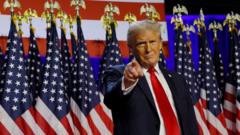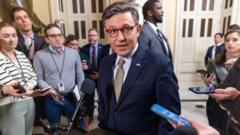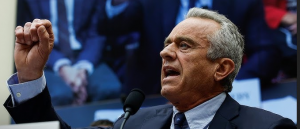As President-elect Donald Trump forms his cabinet, the selection of key figures aims to disrupt traditional governance. With appointing mainly loyal allies rather than experienced policymakers, Trump's choices are causing central debates in Washington. Some nominees have faced controversies, leading to concerns that they may not secure Senate approval. Nonetheless, Trump's team insists they are prepared for all outcomes. In contrast, President Joe Biden is actively reinforcing his climate agenda during a visit to the Amazon, highlighting the stark policy differences between the two administrations.
Trump's Cabinet Choices: Aiming to Shake Up the Status Quo

Trump's Cabinet Choices: Aiming to Shake Up the Status Quo
House Speaker Mike Johnson labels Trump's nominees as "disruptors" of the established norm, revealing a strategic approach to his administration.
President-elect Donald Trump has made headlines with the selection of various "disruptors" to lead his incoming administration, according to House Speaker Mike Johnson. During a recent appearance on CNN's State of the Union, Johnson described Trump’s nominees as individuals who are expected to "shake up the status quo" within the government, a strategic shift that aligns with the broader objectives of the incoming president.
Trump's cabinet-building process has seen him prioritize close allies over candidates with substantial policy experience, generating significant buzz in political circles. Prominent nominees like Pete Hegseth for defense secretary and Matt Gaetz for attorney general are presently embroiled in serious controversies, including allegations of misconduct and ethical violations, sparking bipartisan unease. Trump Jr. defended these selections, emphasizing the need for loyalty and competence among the president's appointees, and acknowledged the potential challenges some nominees might face during Senate confirmation.
With plans for alternative candidates in place, Trump's strategy appears focused on ambitious appointees capable of realizing his promises, despite some individuals being labeled "controversial." The nomination of Chris Wright, an oil executive with fossil fuel industry ties, as energy secretary aligns with Trump’s intention to revitalize fossil fuel production, explicitly undoing the shift toward renewable energy that has gained momentum under President Biden.
Simultaneously, President Biden is reinforcing his commitment to combat climate change, recently becoming the first sitting president to visit the Amazon rainforest. During his trip, he engaged with local leaders and announced new funding initiatives aimed at supporting conservation efforts. In a subtle counterpoint to Trump's impending administration, Biden described climate action as a "defining cause" of his presidency and criticized any attempts to reverse climate progress, framing the future as an opportunity for proactive governance.
The ongoing narrative of contrasting administration styles sets the stage for an intense political landscape, with Trump’s appointees championing a return to traditional energy production while Biden emphasizes climate change mitigation and ecological sustainability. Thus, the discourse surrounding Trump’s cabinet nominees extends beyond mere personnel decisions, reflecting deeper ideological divides that will shape U.S. policy in the years ahead.





















